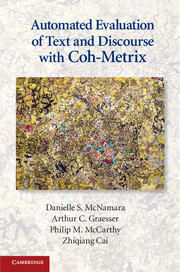Book contents
- Frontmatter
- Dedication
- Contents
- List of Figures
- List of Tables
- Acknowledgments
- Introduction
- Part I Coh-Metrix
- Part II A Beginner’s Guide to Writing Coh-Metrix Research
- 7 The Strategy
- 8 The Introduction
- 9 The Corpus
- 10 The Tool
- 11 The Results
- 12 The Discussion
- Concluding Remarks
- References
- Appendix A Coh-Metrix 3.0 Indices
- Appendix B Coh-Metrix Indices Norms
- Index
12 - The Discussion
Published online by Cambridge University Press: 05 June 2014
- Frontmatter
- Dedication
- Contents
- List of Figures
- List of Tables
- Acknowledgments
- Introduction
- Part I Coh-Metrix
- Part II A Beginner’s Guide to Writing Coh-Metrix Research
- 7 The Strategy
- 8 The Introduction
- 9 The Corpus
- 10 The Tool
- 11 The Results
- 12 The Discussion
- Concluding Remarks
- References
- Appendix A Coh-Metrix 3.0 Indices
- Appendix B Coh-Metrix Indices Norms
- Index
Summary
Whereas the primary purpose of the Results section is to explain what the results of the experiments are, the primary purpose of the Discussion section is to explain what the results of the experiments mean. Put another way, our primary (but by no means the only) task in the Discussion section is to provide a plausible explanation as to the relationship between our results and our theoretical framework. This requirement is the tricky part because, unlike other parts of the paper, which can be very cookie-cutter-esque, the requirement of the Discussion section demands an element of creativity on the part of the researchers. That is, the findings of the study are only circumstantial evidence, and it is up to the investigators to undertake the challenging task of persuading the audience (i.e., the readership, the discourse community) that what was found in the study contributes positively to our current understanding of the world.
This task requires a careful meshing of the guiding theoretical framework and the results. Both can be dauntingly messy. Results are seldom highly significant with huge effect sizes; if they were, then pretty much no one would be interested in the results because they are hardly likely to be telling us anything we didn’t already know, or need to know. So, because frameworks and results are messy, patching them together requires careful consideration, rigorous examination, exhaustive reviewing, and, perhaps most important of all, a creative perspective in order to make a grab-bag of knowledge-ingredients into a comprehensible propositional-cake.
- Type
- Chapter
- Information
- Automated Evaluation of Text and Discourse with Coh-Metrix , pp. 194 - 222Publisher: Cambridge University PressPrint publication year: 2014



